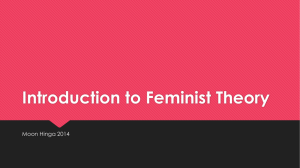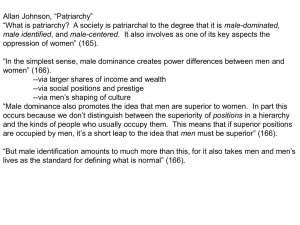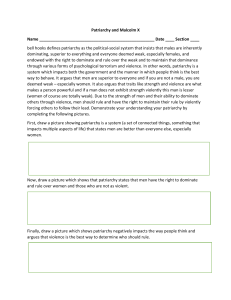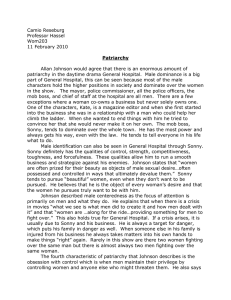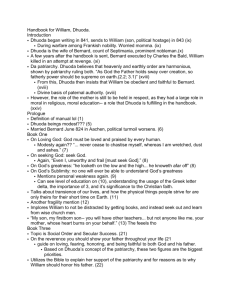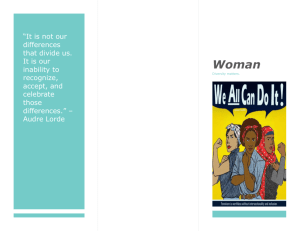File
advertisement
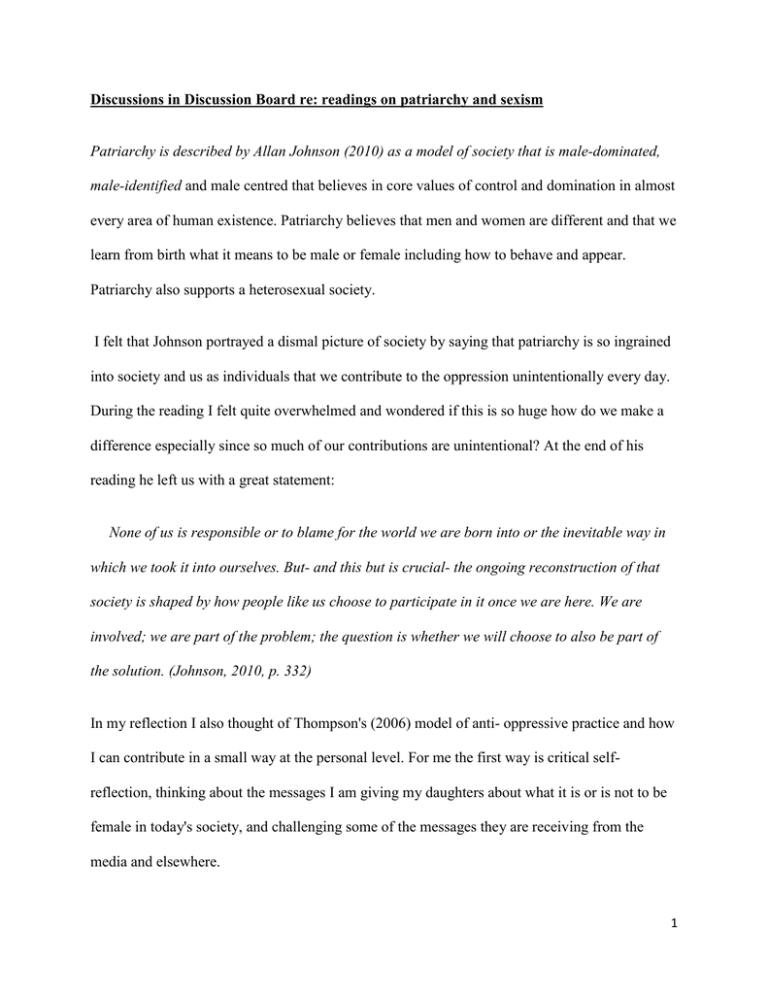
Discussions in Discussion Board re: readings on patriarchy and sexism Patriarchy is described by Allan Johnson (2010) as a model of society that is male-dominated, male-identified and male centred that believes in core values of control and domination in almost every area of human existence. Patriarchy believes that men and women are different and that we learn from birth what it means to be male or female including how to behave and appear. Patriarchy also supports a heterosexual society. I felt that Johnson portrayed a dismal picture of society by saying that patriarchy is so ingrained into society and us as individuals that we contribute to the oppression unintentionally every day. During the reading I felt quite overwhelmed and wondered if this is so huge how do we make a difference especially since so much of our contributions are unintentional? At the end of his reading he left us with a great statement: None of us is responsible or to blame for the world we are born into or the inevitable way in which we took it into ourselves. But- and this but is crucial- the ongoing reconstruction of that society is shaped by how people like us choose to participate in it once we are here. We are involved; we are part of the problem; the question is whether we will choose to also be part of the solution. (Johnson, 2010, p. 332) In my reflection I also thought of Thompson's (2006) model of anti- oppressive practice and how I can contribute in a small way at the personal level. For me the first way is critical selfreflection, thinking about the messages I am giving my daughters about what it is or is not to be female in today's society, and challenging some of the messages they are receiving from the media and elsewhere. 1 As for implications for practice and for leadership in human services I am committed to ensuring that we include an opportunity for education and discussion with the women entering the new family treatment centre on oppression as it relates to sexism, racism, classism, etc. as a way to provide them with a different view on how the "isms" fit with the consequence of addiction and an alternative to self-blame that has been instilled in them. Johnson, A. G. (2010). An it, not a he, a them, or an us. In M. Adams, W. J. Blumenfeld, C. Castaneda, H. W. Hackman, M. Peters & X. Zuniga (Eds.), Readings for diversity and social justice (2nd ed.) (pp. 332-337). New York, NY: Routledge. Mullaly, B. (2010). Challenging oppression and confronting privilege. Ontario: Oxford University Press. Great post Dori, I had written about Johnson's description of patriarchy as well, and you've provided more insight into his definition of patriarchy for me. When you speak of your critical self-reflection and the messages you will share with your daughters I think of your approach as creating opportunities for removing barriers for individuals regarding sexism. Treating people with dignity and respecting their choices is a path to encouraging women to consider societal/patriarchal pressures and expectations when they are trying to make a decision. And your commitment 'to ensuring that we include an opportunity for education and discussion with the women entering the centre' is a wonderful example of incorporating women-centred or gendered approaches into the 'isms'. I appreciate you giving me another view of what Johnson had to say. Thanks! Kerri 2 Hi Dori, Thank you for your post and reflections on patriarchy. I also read this article by Johnson with the intention of gaining further insight into how ingrained this social construct permeates our lives. As Johnson (2010) states, "when oppression is woven into everyday life, we don't need to go out of our way to be overtly oppressive... what evil requires is simply that ordinary people do nothing" (p. 333). During the past few weeks, I have tried to pay attention to the subtle forms of domination and control that occur in daily living- things like behaviours, comments and action that believe the hierarchy of domination and control. Something as simple as setting an agenda or arranging where people sit can be used as a form of control, but can also be used as an opportunity negate power structures and encourage inclusion. I agree that self-reflection and dialogue is critical for us to be able to name those things that perpetuate oppression. Mullaly (2010) and Johnson (2010) both speak of getting off the path of least resistance and we do this when we chose to intentionally address the oppressions we see, be it with our children, our colleagues and the people we serve in profession practice. I commend you for starting the discussion! - Margaret 3 More Discussions re: Patriarchy and Sexism Thank you Kerri for sharing your post. I too read Unit 5 on sexism. While I was reading the unit I was also having an internal struggle about the choice factor- what if women choose to stay home with their children while they are growing up or choose a job where hours are better and wages are lower? What if the payoff is worth it to them not because they are a woman but because it is what they choose to do while raising their children like I did when my girls were young? I than started to second guess my train of thought - Is this the impact patriarchy has had on me- which I was not consciously aware of? I love your insight on self-reflection and building your own strong gender identity and finding ourselves where it fits best for us. I will take this insight and continue to work on my own gender identity as it fits for me. Thanks Dori, I so appreciate your response. I believe patriarchy, as a social structure, is something we can reflect on differently as women. As Allan Johnson titled his articled, it is 'An It, Not a He, a Them, or An Us' and we participate in it. Johnson suggests that we have the opportunity to 'be part of changing or perpetuating it'. (p. 333, Adams et al.). After I read section 5 I recognized that patriarchy was instilled in my worldview as a very negative system that came from men, was and is adored by men and has been maintained by men throughout all of time. Now I see the ways that I have participated in patriarchy (simply by perpetuating that worldview) and am glad to know that I can turn my thinking around through understanding what the system itself has done to men, not just women. Another piece of this sexism discussion for me, particularly around the choice you made and that I made to work within our homes and be with our children, is that often times it is women who 4 place feelings of guilt on fellow women. For my sister it was not acceptable to work solely within my home, I had to get out there and accomplish everything while parenting. But that was how she was built; and no amount of children or a husband was going to stop her. I just wish that we could all value each other's decisions and be more supportive of each other. - Kerri 5
